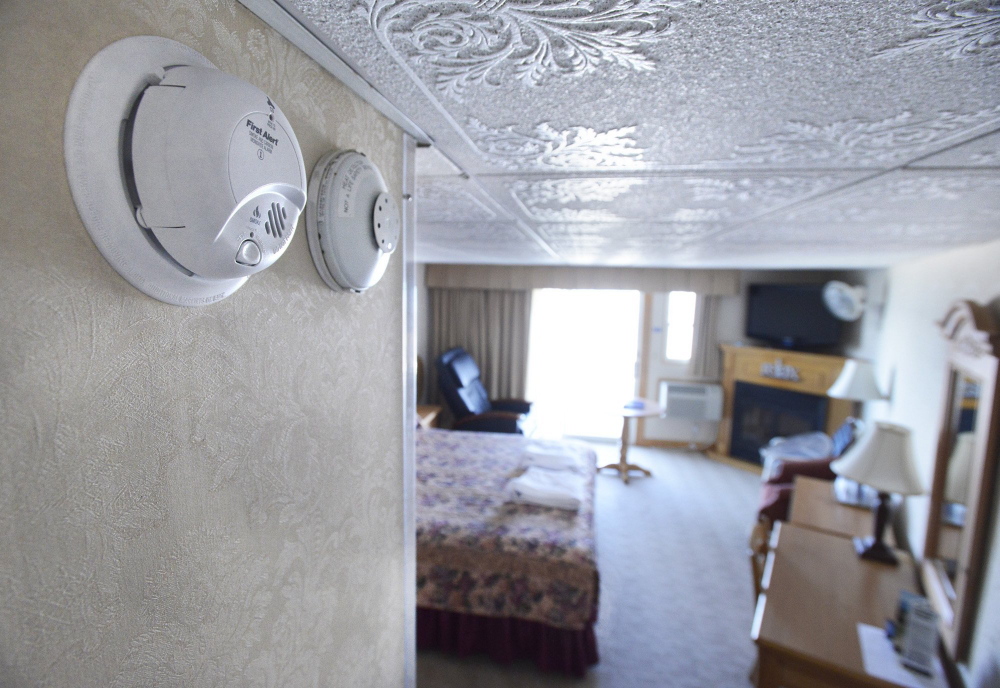When 21 people in an Ogunquit resort were poisoned by colorless, odorless carbon monoxide gas a year ago, many residents and tourists were startled to learn there was no requirement for older hotels and motels to have carbon monoxide detectors.
Now a state legislator has proposed requiring them in all hotels, motels, dormitories and day-care centers.
“As common sense as it is, it’s amazing the places that don’t have it,” said Sen. Bill Diamond, D-Windham, sponsor of the bill, which will be discussed Monday by the Criminal Justice and Public Safety Committee.
Anywhere a smoke detector is required should have a carbon monoxide detector as well, Diamond said. “At least with smoke, you can smell and see it,” he said.
The legislation comes after a winter in which an unprecedented number of carbon monoxide exposures were reported to the Northern New England Poison Control Center, many of them the result of vent pipes being covered up by the season’s heavy snowfall, forcing fumes back into buildings. Carbon monoxide is a byproduct of burning fossil fuels.
In some of those cases, carbon monoxide detectors alerted people to the danger. In others, people became nauseous and experienced headaches, but were able to call for help and get out before they were overcome. In the Ogunquit motel, carbon monoxide levels were 10 times the 35 parts per million that would set off a detector.
“If I had my way, everyone would have a carbon monoxide detector,” said Dr. Karen Simone, director of the Portland-based poison control center.
“Carbon monoxide is a bad poison. If you die, it’s bad. If you don’t die, it can still be bad,” she said, noting that heavy exposure can lead to organ damage and lifelong complications.
Diamond was the driving force behind a 2009 law to require carbon monoxide detectors in rental units and single-family homes that change hands. An amendment in 2011 included homes, hotels, motels and dormitories that were built or extensively remodeled after Aug. 1, 2012.
That bill originally sought to extend the requirement to older buildings, but it faced opposition and got watered down.
Simone, from the poison center, said exempting older properties may make financial sense to somebody, but it doesn’t make sense from a public health standpoint.
“If you think about it, oftentimes what leads to carbon monoxide problems is a malfunction of equipment. Which would be most likely (to malfunction), new construction or something around for a long time?” Simone said.
Extending the requirement to dormitories, fraternities and sororities also is important because young people living close together can sometimes lead to drinking, which makes someone less able to detect the signs of carbon monoxide poisoning – headache, nausea and fatigue, she said.
The current bill would include older properties, and now has the support of some that opposed it in prior years.
“Times have changed and so has technology,” Greg Dugal, of the Maine Innkeepers Association, told the Legislature’s public safety committee at a public hearing last week. When the requirement for mandatory detectors was first proposed, there were few options and they were expensive, he said. Those prices have come down.
Carbon monoxide detectors alone can cost $20 to $30. A combination photoelectric smoke alarm and carbon monoxide detector with a 10-year battery is $30 to $40, said John Martell, of the Professional Fire Fighters of Maine. The organization, which represents union firefighters, strongly favors the current bill.
“Like smoke alarms, the use of these devices has alerted people to the presence of a life-threatening situation,” he wrote in testimony to the committee. “But unfortunately, we have all read the sad stories of those who have died because no alarms were in place.”
Nationwide, the gas killed an average of 430 people a year from 1999 to 2010. That number has ranged from zero to five in Maine from 2000 to 2010.
At the public hearing held March 30, no one spoke against the measure, although several groups sought clarification on exactly where and what type of detector would be required.
Derek Langhauser, interim president of the Maine Community College System, said the dormitory requirements would affect five of the state’s seven community colleges. Requiring detectors in the hallways outside dorm rooms would be a manageable expense, but if they were required inside every dorm room, the cost would be about $35,000, he said.
One class of residential property would remain exempt from the requirement – single-family homes.
The bill as written would have included single-family homes, but Diamond said that requirement is being withdrawn to improve the chances that the rest of the bill will pass.
“There were so many good things in here, I didn’t want to put all of that in jeopardy,” he said, noting that there was resistance – particularly in rural areas – to extending the requirement to single-family homes.
The Association of Maine Realtors spoke against the single-family home requirement, saying it would be difficult to enforce and that even informing homeowners of the requirement would be a challenge. Homeowners might be liable if a person suffered from carbon monoxide poisoning and no detector was present because the owner was unaware of the requirement, said Barbara Berry, speaking for the Realtors association.
Diamond said he believes the requirement is important, but that will have to be an issue for future legislation.
According to the National Conference of State Legislatures, 29 states have enacted laws regarding carbon monoxide detectors.
Some, like Massachusetts, require carbon monoxide detectors in any residential unit heated with fossil fuels or that has an attached parking garage. In Michigan, the requirement applies only to newly constructed hotels or motels.
In New Hampshire – much like the current Maine law – detectors are required in rentals as well as single- and multi-family dwellings built or renovated after 2010.
Diamond says it’s hard to understand why anyone in the hospitality industry or the child care or education fields wouldn’t want to protect the people in their charge.
“We don’t want to wait ’til some major tragedy to do something,” Diamond said. “We can prevent that from happening.”
Send questions/comments to the editors.




Success. Please wait for the page to reload. If the page does not reload within 5 seconds, please refresh the page.
Enter your email and password to access comments.
Hi, to comment on stories you must . This profile is in addition to your subscription and website login.
Already have a commenting profile? .
Invalid username/password.
Please check your email to confirm and complete your registration.
Only subscribers are eligible to post comments. Please subscribe or login first for digital access. Here’s why.
Use the form below to reset your password. When you've submitted your account email, we will send an email with a reset code.